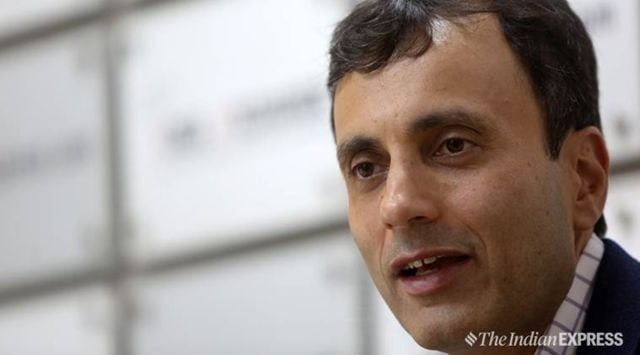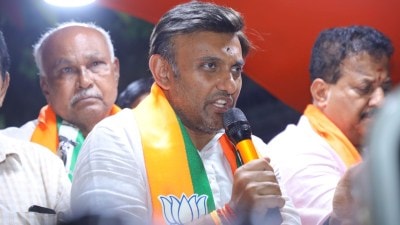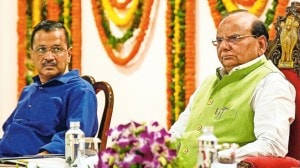- India
- International
Ruchir Sharma at Express e-Adda: ‘High debt, fiscal deficit… India can’t print its way out of the mess’
Sharma, whose latest book ‘The 10 Rules of Successful Nations’ has been recently launched’, was in conversation with Anant Goenka, Executive Director, The Indian Express, and P Vaidyanathan Iyer, Executive Editor for National Affairs.
 New York-based Sharma, who is one of the finest observers of contemporary Indian politics and economy.(File)
New York-based Sharma, who is one of the finest observers of contemporary Indian politics and economy.(File)WHILE COUNTRIES like the United States have extended sizeable fiscal stimulus packages during the Covid-19 pandemic, India’s standing as a developing country with high public debt and fiscal deficit makes it difficult to follow suit, according to Ruchir Sharma, Head of Emerging Markets and Chief Global Strategist at Morgan Stanley Investment Management.
The country cannot “print” its way out of “this mess”, he said at the Express e-Adda on Monday.
To a question on the demand by many experts and economists to spend more, Sharma said: “I’m much more sympathetic to the government’s stance, which is on the fiscal front, than to what the experts are saying, because I find that, in India’s case — this is a line that I borrowed from one of my favourite movies Top Gun — that our ego keeps writing checks which our body can’t cash.”
Sharma, whose latest book ‘The 10 Rules of Successful Nations’ has been recently launched’, was in conversation with Anant Goenka, Executive Director, The Indian Express, and P Vaidyanathan Iyer, Executive Editor for National Affairs.
“We keep thinking we have lots of money and the US is doing stimulus of X per cent and the UK doing a stimulus of Y, so why can’t we do a similar stimulus? And my point is this: that we are still a developing country,” he said.

“Firstly, when you compare our external stimulus, compare it to other developing countries. More than that, we entered this crisis with one of the highest public debts and fiscal deficits in the world, especially in the emerging world. So, if you enter, and that’s your starting point, then how can you afford to spend much more?” he said, adding that the government has done “what it can”.
“On monetary policy, this government has done what the other governments have done, but, even as far as monetary policy is concerned, we’ve got to keep in mind that India’s inflation rate is still more sticky compared to other countries in the world, even other developing countries in the world.” he said.
“If that is your situation, for you to just throw caution to the wind and say, ‘I’m just going to go and print our way out of this mess’ (is not reasonable). Look at the examples of other emerging countries, Turkey is trying that… But look at the results that (it is) getting. The economy is a complete mess in Turkey, it makes our economic management look stellar…,” he said.
Sharma, however, said that in March-end, he had said national lockdowns are unsustainable for a developing country like India.
On India’s growth prospects in the foreseeable future (5-10 years), Sharma said the country is not going to grow at a rate of more than 5 per cent, which itself would be a challenge at a time of de-globalisation, changing demographics and rising debt levels.
“I don’t think India is going to grow… at a pace of more than 5 per cent on a sustained basis for the foreseeable future, because growth everywhere is coming down across the world. And, for a developing economy with a per capita income of less than $5,000, if you’re able to grow at even 5 per cent, I think… that’s going to take a lot in an era where you have de-globalisation, where you already have high debt levels,” he said.
“Even India’s demographics have changed…the days when India’s demographics could power growth, that also has shown now that India’s working population growth has fallen below 2 per cent. That’s a very different propeller approach, compared to what it used to be historically,” he said
“As far as India is concerned, the line that I’ve always used is — and I don’t feel compelled to change that line about India — that this is a country that consistently disappoints the optimism in the pessimists,” he said. According to him, there is a need for the Central and state governments to provide more economic freedom.
“Unfortunately, I don’t think it’s just about this government at the state level, I think what this episode has shown me, including the pandemic, is the incredible ability to hoard power… that is such an obsession, and you have so many supremos at the state level as well. So, to me, that is the disappointment…,” said Sharma. “And maybe that’s something bottom up…But I just wish that there was more of a… free market liberal agenda in this country than what we have,” he said.
Apr 27: Latest News
- 01
- 02
- 03
- 04
- 05








































